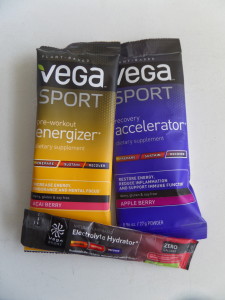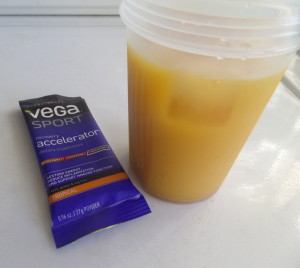
High-intensity training and endurance sports both require recovery, an element of training that athletes often ignore. That’s a shame, since just a little planning for recovery can improve athletic performance—better recovery means less inflammation and faster bodily repair, resulting in less down-time between workouts—while poor recovery can lead to extended muscle pain and soreness, and lack of energy.
Nutrition is the first element of recovery, and something you should start to take care of immediately—within 20 minutes or so of finishing your workout or event—for optimum results. Recovery nutrition is the first step towards replacing the nutrients depleted during your workout. Many athletes crave carbohydrates, and historical sports nutrition advice was to consume carbohydrates to replenish glycogen stored in the muscles (which is consumed during exercise). More recent studies indicate that a carbohydrate and protein supplement is more effective in replenishing muscle glycogen, and that the effect is most noticeable during the first 40 minutes of recovery; at least one study also suggests that a combination carbohydrate and protein would be also be preferable for weight-management programs. (See Ivy, et al., below) Sources I was able to locate differ on whether a 4:1 or 3:1 ratio of carbohydrates to protein is best, but all agree that adding the protein enhances recovery.
A quick disclaimer: I was provided a box of Vega Recovery Accelerator packets to try out and review; per my integrity statement, all of the opinions below are my own, and there is no “sponsored” or pre-written text. The Vega team actively supports my local athletic community, and I have tried the other Vega Sport products and talked to Vega representatives at the Esprit de She 5k benefitting Silicon Valley Girls on the Run, the San Francisco America’s Cup boot camp workouts sponsored by Puma, and most recently the Livermore Half Marathon. This is significant because I’m predisposed to like any company that supports local athletics, even if I don’t care for their products very much. (If I do like the products, I’m more likely to patronize a company that supports local events.) At the Livermore Half Marathon I also picked up a sample of the Pre-Workout Energizer (which led me to buy a tub of it), and a booklet called the Vega Sport Nutrition Guide 2013.

Vega Recovery Accelerator is a plant-based beverage powder designed for post-workout recovery nutrition. It does not contain casein, whey, or soy, making it ideal for those with milk and soy allergies or sensitivities. Since it has no animal-derived ingredients, it is also suitable for vegetarians. On the nutrition side, it has a 4:1 carbohydrate to protein ratio, and contains 23 plant-based ingredients selected to support recovery by replenishing electrolytes (such as sodium and potassium), replenishing glycogen stores, and reducing inflammation (turmeric and cayenne). Turmeric contain a substance called curcumin, which studies show can reduce inflammation and counter some exercise-induced muscle damage. (See Davis, et al., below.)
One serving of Vega Recovery Accelerator has 80 calories and no artificial dyes or weird fake sugars (sweetness—and the carbohydrates, in part—comes from whole grain brown rice sweetener and stevia extract). The protein is a mix of pea protein and sprouted whole grain brown rice. Like all of the Vega Sport products, Vega Recovery Accelerator is Informed-Choice certified: it has been tested to ensure it contains no substances on the World Anti-Doping Agency list of banned substances. (You can read more about this certification at www.Informed-Choice.org)
On the performance side, Vega Recovery Accelerator is available in two flavors (apple berry and tropical), and in tubs or portable individual serving-sized packets. Unlike most sports drinks I have tried, it does not have a particularly appealing Pantone pretty color to it and when mixed in a clear glass looks more like cloudy apple juice than Kool-Aid (which I believe is a plus—no synthetic colors). My favorite aspect of Vega Recovery Accelerator is that it mixes easily and dissolves completely. (Chunky, gritty, sandy post-workout drinks are a pet peeve of mine.) I prefer my post-workout drinks cold, but both flavors also have a pleasant taste at room temperature (ice cold, it’s pretty tasty and not sickeningly sweet like many sports drinks).
Vega’s recovery products also include the Vega Protein Bar, and Vega Recovery Protein. You can read more about them, and download a free e-book at http://vegasport.com
Thumbing my nose at the many hours I was forced to spend getting chummy with The MLA Handbook (I prefer “the Bluebook” for law, and The Chicago Manual of Style for everything else), these citations do NOT conform to MLA format:
Davis JM, Murphy EA, Carmichael MD, Zielinski MR, Groschwitz CM, Brown AS, Gangemi JD, Ghaffar A, Mayer EP. “Curcumin effects on inflammation and performance recovery following eccentric exercise-induced muscle damage.” Am J Physiol Regul Integr Comp Physiol. 2007 Jun;292(6):R2168-73. Epub 2007 Mar 1. (Abstract available online at http://www.ncbi.nlm.nih.gov/pubmed/17332159)
John L. Ivy , Harold W. Goforth Jr., Bruce M. Damon , Thomas R. McCauley , Edward C. Parsons , Thomas B. Price. “Early postexercise muscle glycogen recovery is enhanced with a carbohydrate-protein supplement.” Journal of Applied Physiology Published 1 October 2002Vol. 93no. 1337-1344DOI: 10.1152/japplphysiol.00394.2002 (Available online at http://jap.physiology.org/content/93/4/1337)